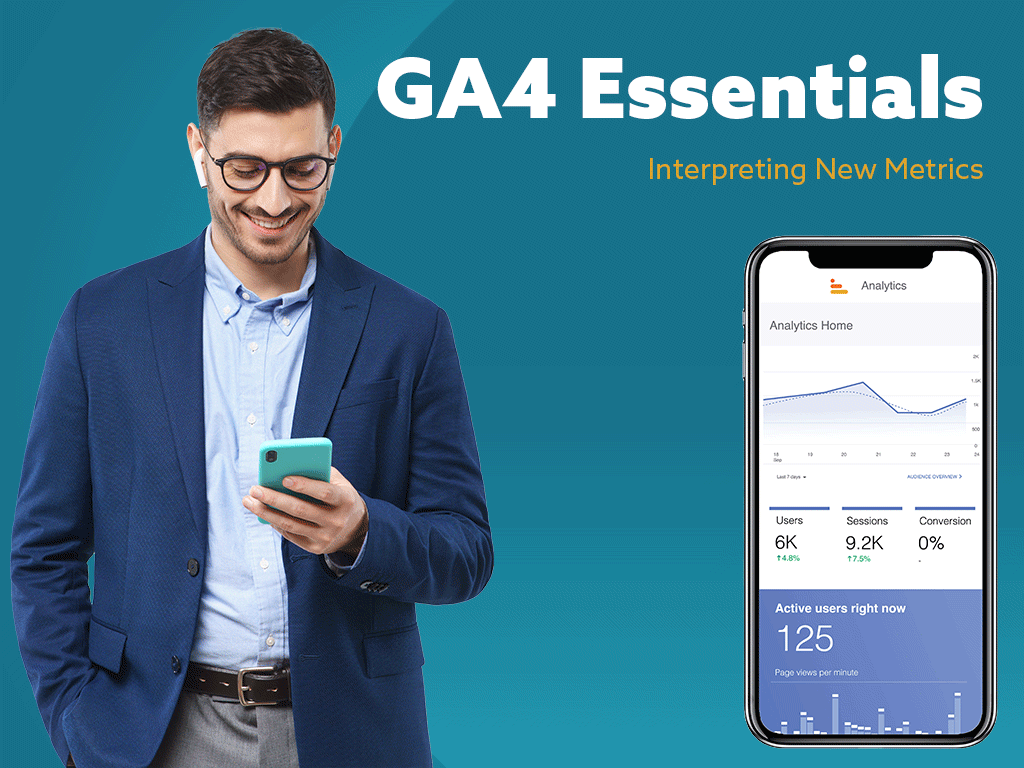GA4 Essentials: Interpreting New Metrics in GA4 [Updated]
- 5 January 2021

The launch of GA4 came with the addition of new metrics in Google’s latest analytics platform, along with the removal of some commonly used ones. Since the switch to mobile-first websites, website layouts have become increasingly centered around scrolling rather than page clicks to navigate a website. Rather than base website analytics at a session level, the new platform focuses more on tracking activity at a user level.
In GA4, Google changed the way they look at what constitutes an engaged website session and an engaged user. They decided that a session-based approach looking at page views per session, average session duration, and bounce rate didn’t do a great job of capturing how active a user is on a website.
For example, if a user lands on a website, finds the information they need quickly, and then leaves the site, that is considered a bounce and looked at as a negative experience in the current analytics platform. In the new platform, the user’s engagement with the site is measured by how often they scrolled on the page and what actions they took when they were on the site (ex: pressing buttons and filling out forms) to determine if they had a good experience.
Here are the new metrics in GA4 and how to use them to analyze your website behavior.
New GA4 Metric: Engaged Sessions
These are sessions that last longer than 10 seconds, had a conversion event, or had two or more screen or page views.
This new metric looks beyond the occurrence of a session and reflects the quality of the session.
A session in GA4 is created when an app or webpage is opened and ends when 30 minutes of inactivity have occurred from a user.
In Universal Analytics, when the campaign source changes mid-session, it is counted as two separate sessions. GA4 counts this as one session. This provides more accurate session measurements and will result in lower session counts than what you might be used to in the previous platform.
New GA4 Metric: Engagement Rate
Engagement rates represent “engaged sessions” divided by “total sessions”.
This new metric gives Google Analytics users the ability to compare the quality of their website traffic by acquisition channel. This metric was created to replace bounce rate as a measure of traffic quality.
In the past, a marketing channel that had a high bounce rate was judged as being a lower-performing traffic source. This misjudged the effectiveness of marketing campaigns that led to active website traffic that happened to only view one page. This new metric will change the way marketers assess a campaign to encompass user actions that reflect active participation on a website or app.
New GA4 Metric: Engaged Sessions Per User
Engaged sessions per user reflect your engaged sessions divided by the number of users in a given time period.
With better user tracking, Google can now help marketers tie multiple website experiences to a user. Viewed in aggregate, this can help marketers understand how effective their efforts are at bringing people back to the website.
Other improvements in GA4 make this tracking even more valuable for analytics users that have both an app and a website. One of the new changes that GA4 brought was cross-platform tracking between apps and websites. With new cross-platform tracking analytics, users can measure engaged sessions per user across apps and websites. This helps marketers and developers analyze a more holistic user experience.
New GA4 Metric: Average Engagement Time
In place of average session duration, average engagement time measures the length of time an app was in the foreground, or a website was in focus in the browser.
Since the bar is set higher for average engagement time compared to average session duration, your stats may look lower than what you are used to.
Conclusion
GA4 offers marketers a range of new and exciting ways to track user engagement on websites. Gone are the days of relying on bounce rates to evaluate how engaged your website visitors are. Now marketers have more tools in their tool belts to assess the effectiveness of campaigns.
Interested in learning more about what’s new in GA4? Watch this webinar recording with Google rep Nick Danford and the Conversion Logix team.
